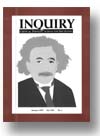|
2.
|
Inquiry: Critical Thinking Across the Disciplines:
Volume >
19 >
Issue: 1
John Miller
Critical Thinking and Asynchronous Discussion
abstract |
view |
rights & permissions
| cited by
Among the claims made for online learning is its potential to foster critical thinking, particularly by engaging students in asynchronous discussions conducted in writing. This paper reviews and critiques these claims. It first examines the uses of writing and classroom discussion in modeling and encouraging critical thinking. It then reviews some of the arguments for the possible advantages of online interaction over face-to-face discussion. Finally, it critiques these claims by comparing the specific features, which distinguish the experience of participation in asynchronous written discussions from synchronous oraldiscussion. This comparison illuminates the role of oral discussion in modeling and developing students’ critical thinking skills and points out difficulty of doing so through asynchronous computer-mediated discussions.
|
|
|
3.
|
Inquiry: Critical Thinking Across the Disciplines:
Volume >
19 >
Issue: 1
William Peirce
World Wide Web URLs for Resources for Teaching Reasoning and Critical Thinking
abstract |
view |
rights & permissions
| cited by
A selective compilation of 24 useful websites likely to interest a practicing teacher of thinking; it is not directed at scholar-researchers in any particular discipline. Hence, Web resources in philosophy, psychology, and cognitive science are not included. Also excluded are well-known general Internet comprehensive lists of resomces in the various disciplines and the many sites helpful to students writing researched persuasive arguments which can be found in any recent writing handbook. Included are general comprehensive resources in higher education, communication (including writing) across the curriculum, resources on teaching critical thinking, problem-based learning, and publishers specializing in critical thinking.
|
|





